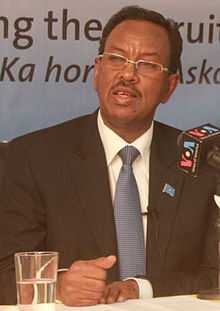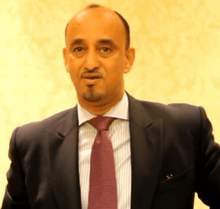Prime Minister of Somalia
| Prime Minister of Somalia | |
|---|---|
|
| |
| Style | His Excellency |
| Appointer |
Hassan Sheikh Mohamud, as President of Somalia |
| Inaugural holder | Abdullahi Issa Mohamud |
| Formation | 29 February 1956 |
| Deputy | Deputy Prime Minister of Somalia |
 |
| This article is part of a series on the politics and government of Somalia |
|
Constitution |
|
|
Judiciary |
|
Politics portal |
The Prime Minister of Somalia (Somali: Ra'iisul wasaare, Arabic: رئيس وزراء الصومال) is the head of government in Somalia. There have been 18 official prime ministers since the office was created in 1956. The first Prime Minister was Abdullahi Issa Mohamud, who served prior to independence in the Trust Territory of Somalia. The incumbent Prime Minister of the Federal Government of Somalia is Omar Abdirashid Ali Sharmarke.
Prime Ministers of Somalia (1956–Present)
| No. | Name (birth–death) |
Picture | Took office | Left office | Political party |
|---|---|---|---|---|---|
| Trust Territory of Somalia | |||||
| 1 | Abdullahi Issa Mohamud (1921–1988) |  | 29 February 1956 | 1 July 1960 | Somali Youth League |
| Somali Republic | |||||
| 2 | Muhammad Haji Ibrahim Egal (1928–2002) |  | 1 July 1960 | 12 July 1960 | Somali Youth League |
| 3 | Abdirashid Ali Shermarke (1919–1969) |  | 12 July 1960 | 14 June 1964 | Somali Youth League |
| 4 | Abdirizak Haji Hussein (1924–2014) |  | 14 June 1964 | 15 July 1967 | Somali Youth League |
| (2) | Muhammad Haji Ibrahim Egal (1928–2002) |  | 15 July 1967 | 21 October 1969 | Somali Youth League |
| Somali Democratic Republic | |||||
| 5 | Mohamed Farah Salad (–) |  | 1 November 1969 | March 1970 | Military |
| Post Abolished (March 1970–1 February 1987) | |||||
| 6 | Muhammad Ali Samatar (1931– ) |  | 1 February 1987 | 3 September 1990 | Somali Revolutionary Socialist Party |
| 7 | Muhammad Hawadle Madar (–) |  | 3 September 1990 | 24 January 1991 | Somali Revolutionary Socialist Party |
| Somali Civil War | |||||
| 8 | Umar Arteh Ghalib (1930– )[1] |  | 24 January 1991 | May 1993[2][1] | United Somali Congress |
| Vacant (May 1993–8 October 2000)[1] | |||||
| Transitional National Government | |||||
| 9 | Ali Khalif Galaydh (1941– ) | | 8 October 2000 | 28 October 2001 | Independent |
| — | Osman Jama Ali (acting) (1941– ) |  | 28 October 2001 | 12 November 2001 | Independent |
| 10 | Hassan Abshir Farah (1945– ) |  | 12 November 2001 | 8 December 2003 | Independent |
| 11 | Muhammad Abdi Yusuf (–) |  | 8 December 2003 | 3 November 2004 | Independent |
| Transitional Federal Government | |||||
| 12 | Ali Mohammed Ghedi (1952– ) | | 3 November 2004 | 29 October 2007 | Independent |
| — | Salim Aliyow Ibrow (acting) (–) |  | 29 October 2007 | 24 November 2007 | Independent |
| 13 | Nur Hassan Hussein (1938– ) |  | 24 November 2007 | 14 February 2009 | Independent |
| 14 | Omar Abdirashid Ali Sharmarke (1960– ) |  | 14 February 2009 | 21 September 2010 | Independent |
| — | Abdiwahid Elmi Gonjeh (acting) (–) |  | 24 September 2010 | 31 October 2010 | Independent |
| 15 | Mohamed Abdullahi Mohamed (1962– ) | | 31 October 2010 | 19 June 2011 | Independent |
| 16 | Abdiweli Mohamed Ali (1965– ) |  | 19 June 2011 | 20 August 2012 | Independent |
| Federal Republic of Somalia | |||||
| 16 | Abdiweli Mohamed Ali (1965– ) |  | 20 August 2012 | 17 October 2012 | Independent |
| 17 | Abdi Farah Shirdon (1958– ) |  | 17 October 2012 | 21 December 2013 | Independent |
| 18 | Abdiweli Sheikh Ahmed (1959– ) |  | 21 December 2013 | 24 December 2014 | Independent |
| (14) | Omar Abdirashid Ali Sharmarke (1960– ) |  | 24 December 2014 | Incumbent | Independent |
Deputy Prime Ministers
| No. | Name (birth–death) |
Picture | Took office | Left office | Political party |
|---|---|---|---|---|---|
| Transitional Federal Government | |||||
| 15 | Abdihakim Mohamoud Haji-Faqi (–) |  | 12 November 2010 | 20 July 2011 | Independent |
| 16 | Hussein Arab Isse (–) |  | 20 July 2011 | 20 August 2012 | Independent |
| Federal Republic of Somalia | |||||
| 16 | Hussein Arab Isse (–) |  | 20 August 2012 | 4 November 2012 | Independent |
| 17 | Fowsiyo Yusuf Haji Adan (–) |  | 4 November 2012 | 17 January 2014 | Independent |
| 18 | Ridwan Hirsi Mohamed (–) |  | 17 January 2014 | Incumbent | Independent |
See also
- Somalia
- Politics of Somalia
- List of colonial heads of British Somaliland
- List of colonial heads of Italian Somaliland
- Heads of state of Somalia
- Lists of office-holders
Notes
- ↑ 1.0 1.1 1.2 From November 1991 to 2000, there was no recognized central government. The southern part of the country was controlled by different faction leaders; notably General Mohamed Farrah Aidid, who claimed to be President from 15 June 1995 to his death on 1 August 1996, followed by his son Hussein Farrah Aidid from 4 August 1996 to 20 March 1998. Decentralization took place in other areas, characterized by a return to customary and religious law in many places as well as the establishment of autonomous regional governments in the northern part of the country.
- ↑ De facto remained in office to 3 January 1997
References
| ||||||||||||||||||||||||||||||||||||||||||||||||||||||||||
| |||||||||||||||||||||||||||||||||